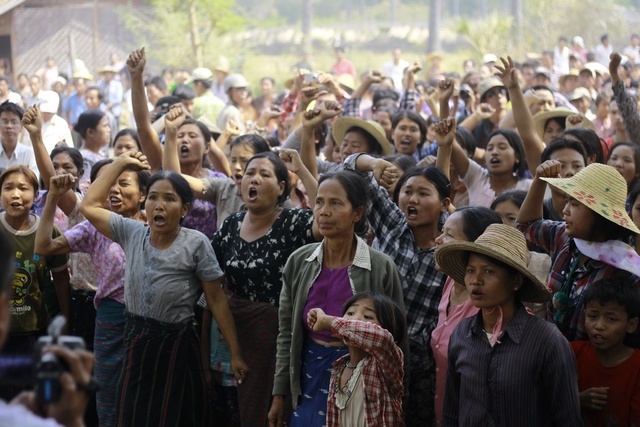Over 150 locals in central Burma’s Monywa staged another round of protests against the controversial China-backed Latpadaung copper mine on Wednesday after police and security guards began bulldozing their farms on the project site.
The farmers have refused to accept the compensation offered for their lands, which were confiscated to make way for the expansion of the mining project. They told DVB that guards working for the Chinese Wanbao company turned up with police protection on Tuesday to begin clearing their old farmlands anyway.
“They bulldozed the pea and sesame crops in my farm up on the Leikhun hill which we see as blatant bullying,” said Yi Win, a resident from Sete village, adding that the officials have built a fence around the area.
Aung Myo Thant from Tonywa village said the locals have reached out to the Sagaing division’s Security and Border Affairs Minister Colonel Kyi Naing to stop the company from destroying their farmlands, but no action had been taken so far.
“The colonel pledged to help mediate the situation but has done nothing so far,” said Aung Myo Thant.
The Latpadaung project, which is a joint military and Chinese venture, has provoked outrage from locals who say it will cause irreversible environmental damage and has forced hundreds from their homes.
It rose to notoriety last year when the government led a bloody crackdown on a group of peaceful protestors, resulting in dozens of monks being severely burned. A controversial parliamentary investigation led by Aung San Suu Kyi later ruled that the project should go ahead, despite local objections.
A member of Suu Kyi’s investigation commission and lower house MP, Khin San Hlaing, reportedly met with local Monywa authorities in mid-October in an effort to negotiate a new land compensation deal, but it ended in failure.
The disappointed villagers subsequently destroyed the fence erected around the project, and began to plough their farmlands in a show of defiance. These so-called plough protests have become an increasingly popular among farmers in Burma, as an influx of foreign investment continues to fuel land grabs across the country.
Over 120 local farmers from 12 villages in Latpadaung on Thursday held a meeting to discuss the issue of compensation, and decided to call for negotiations with more senior figures of authority.
“We have decided to call for a meeting specifically with someone who can make a decision instead of sending another letter [to the authorities],” said Min Min, a member of the local anti-mine campaign group, the Committee to Protect the Interests of the Latpadaung Mountain.
The residents, who are from Latpadaung’s Mogyopyin, Tonywa and Sete villages, say they will continue to fight against the project. Work on the unpopular mine recently resumed after Wanbao agreed a new contract with the government.
However, lawmakers have said that the project still does not meet the requirements set out in the state-backed investigation commission, including demands for greater transparency on issues relating to public health and environmental impacts.



